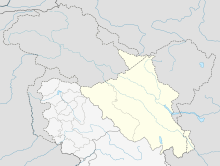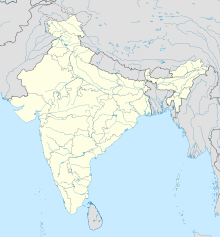Fukche
Fukche Advanced Landing Ground | |
|---|---|
 | |
| Summary | |
| Airport type | Military |
| Operator | Indian Air Force |
| Location | Ladakh, India |
| Elevation AMSL | 13,700 ft / 4,176 m |
| Coordinates | 32°56′15″N 79°12′48″E / 32.93750°N 79.21333°E |
| Map | |
 | |
Fukche Advanced Landing Ground[2] (ICAO: VI66)[1] is an airfield in the Demchok sector of the union territory of Ladakh, India. It was built shortly before the 1962 Sino-Indian War and was revived in 2008. It is located adjacent to Koyul, 34 km northwest of Demchok.
Location
The Fukche Landing Ground is in the Koyul Lungpa river valley, close to the confluence of the river with the Indus River (called "Sengge Zangbo" locally). The Line of Actual Control (LAC) with China, which runs along the Indus River, is only 2.5 kilometres away.[3] Beyond the LAC is Chinese-controlled Demchok sector up to the Chang La pass (also called Xingong La).
There is a regular highway from Fukche to Dungti and beyond (leading to Leh and Chushul), and an unmetalled road to Demchok, 34 km southeast at the southern tip of the Indian-controlled Demchok sector.
China runs a "Sengge Zangbo highway" adjacent to the LAC and a "Kigunaru highway" going to Chang La and beyond.
History
The landing ground was first prepared in 1961 in advance of the 1962 Sino-Indian war. It was the sixth such landing ground to be prepared in Ladakh, starting with Leh in 1948 (which was in the midst of the First Kashmir War). According to a retired Army officer, "The Landing Grounds were built on grounds that were hard, barren and sandwiched between almost a range of parallel running mountains. At most places it was a question of removing boulders, filling potholes and generally leveling the ground. The good old infantry equipment of a pick axe, shovel and crow bar came in very handy."[4]
After the 1962 Sino-Indian war, the airstrip fell out of use. It was reopened on 4 November 2008 by the Indian Air Force, when an AN-32 transport aircraft was successfully landed there.[5][6] The reactivation of the landing ground, along with another reactivation of the Daulat Beg Oldi airstrip earlier in May of the same year, allows Indian forces to deploy faster and in greater numbers, which China is believed to have taken as a threat.[7] During the 2013 Depsang standoff, China demanded the bunkers being constructed at Fukche be stopped. But the Indians pointed out the constant upgrading of the Chinese infrastructure on their side of the LAC. In the end, the Chinese disengaged at Despang without insisting on concessions regarding Fukche.[8]
Facilities
The airfield has an unpaved gravelly runway of 2 miles length. It accommodates small transport aircraft, meant for inducting or recycling troops at the border.[6]
Road connectivity
"Chushul-Dungti-Fukche-Demchok Highway" (CDFD road), along the southern bank of Indus River which marks the LAC, will be converted to a single-lane 7.45 m wide 135 km long national highway with paved shoulder by 31 March 2025. Chushul and Fukche Airstrips lie along this highway. It will also provide faster access to the Nyoma airbase.[9]
"Likaru-Mig La-Fukche Road" (LMLF Road), through 19,400 ft Mig La, commencement of construction was announced by the BRO on 15 August 2023. After the completion, it will overtake the "Chisumle-Demchok Road" (via Umling La, 19,300 ft) to become the highest motorable road in the world. Road via Umling La already passes at a height higher than the base camp of world's tallest mountain, the Mount Everest.[10]
See also
References
- ^ a b "Fukche Airbase Code". World Airport Codes. Retrieved 3 February 2020.
- ^ Fukche Advanced Landing Ground Airport, airortguide.com, retrieved 10 October 2019.
- ^ "IAF aircraft lands at a forward base on India-China border", Thaindian News, 4 November 2008, archived from the original on 12 February 2009
- ^ Rao, Nirupama Menon (2022), The Fractured Himalaya: India Tibet China : 1949 to 1962, Penguin Random House, Chapter 15, ISBN 9780670088294
- ^ "IAF craft makes successful landing near China border", NDTV News, 2008, archived from the original on 5 September 2012
- ^ a b Sujan Dutta, IAF lands on Ladakh strip, The Telegraph, 4 November 2008.
- ^ Sujan Dutta, Delhi spies airstrip design in China tents, The Telegraph (India), 30 April 2013.
- ^ Shishir Gupta, The Himalayan Face-off (2014), Chapter 1 (Introduction): "Indian reasons were quite evident as the PLA was constantly upgrading its infrastructure across eastern Ladakh with roads coming close to the notional LAC and a huge military observation post coming up at Demchok, north of Chumar.".
- ^ BRO starts process for 135-km road near LAC from Chushul to Demchok, News18, 24 Jan 2023.
- ^ "On Independence Day, BRO begins work on key road in Ladakh sector". Hindustan times. 16 August 2023.
Bibliography
- Gupta, Shishir (2014), The Himalayan Face-Off: Chinese Assertion and the Indian Riposte, Hachette India, ISBN 978-93-5009-606-2
Further reading
- Air Marshal K. K. Nohwar, Pace of Infrastructure Development in Border Areas: Adequate? Archived 18 May 2021 at the Wayback Machine, Centre for Air Power Studies, 13 March 2018



